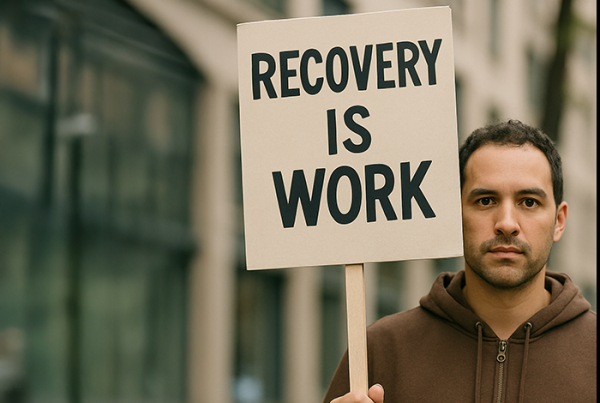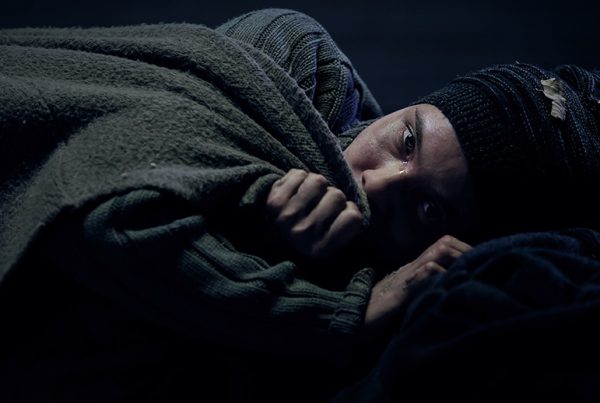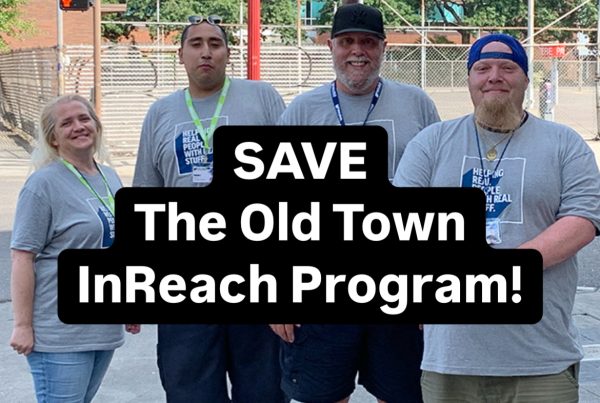Untreated mental illness is causing homelessness for vulnerable people in Oregon. We must find ways to help people and end this crisis.
After witnessing the horrific neglect and decline of a mentally and physically vulnerable woman on our streets I feel compelled to write about our failure as a community to properly care for people with significant mental illness.
At Blanchet House, we serve meals to people with mental and physical challenges every day. Serving people on the margins has always been part of our mission, but since the COVID-19 pandemic, the number of diners exhibiting severe mental health has grown and their behaviors are much more debilitating. Many are homeless women, who must ward off violence day and night, further escalating their trauma and mental decline. Sadly, more than a few of the individuals we’ve gotten to know over the years have died. Some of them have perished from violence because they are such easy prey due to their afflictions.
When our volunteers see a person lying in filth on the sidewalk they ask us, ‘Isn’t there something we can do?’ They are horrified by the sight of a person degraded and vulnerable, unable to care for themselves. These are people with bloody sores and wounds, sometimes naked because their mental health won’t let them keep clothes on. Our volunteers plead, ‘There has to be someone we can call!’
But there isn’t anyone to call. Not really.
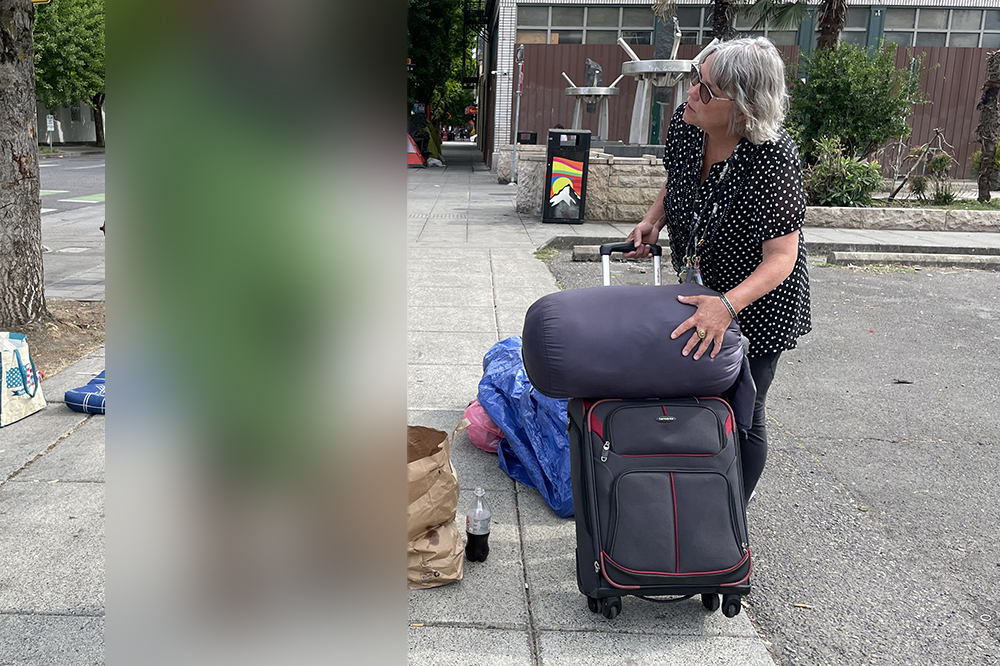
Jennifer Ransdell, the services manager of Blanchet House’s free cafe, helps M with a sleeping bag and suitcase after she was released to the street from the hospital.
We can call for an ambulance, but if the person doesn’t want to get in, there’s not much the EMTS can do. And even if a person is taken to a hospital for treatment, they are released to the streets later that day or the next. But, what’s changed is that they now lie on the sidewalk wearing a hospital gown.
Which brings me to the story of M (not her real first initial). M has lived on Blanchet House’s sidewalk for more than a year. Diagnosed with schizophrenia, this individual can barely care for herself. We bring her food, coffee, changes of clothes, and bath wipes after she’s soiled herself because she was unable to get up to use the bathroom. We’ve called every local and state service provider or agency our team can think of to get her permanent help and off the street. By law, she doesn’t qualify as “a danger to herself as others.” However, we’ve seen her bruised and bloodied from being assaulted. We’ve seen her hostile and aggressive toward others. And we’ve seen her be still for days, lethargic, unable even to feed herself. But still, she’s evidently “not a danger to herself or others.”
Watching M rapidly decline over the past months, Blanchet House staff has been committed to getting her help come hell or high water. After months of persistence, we believed that we finally found help for M.
Or so we thought.
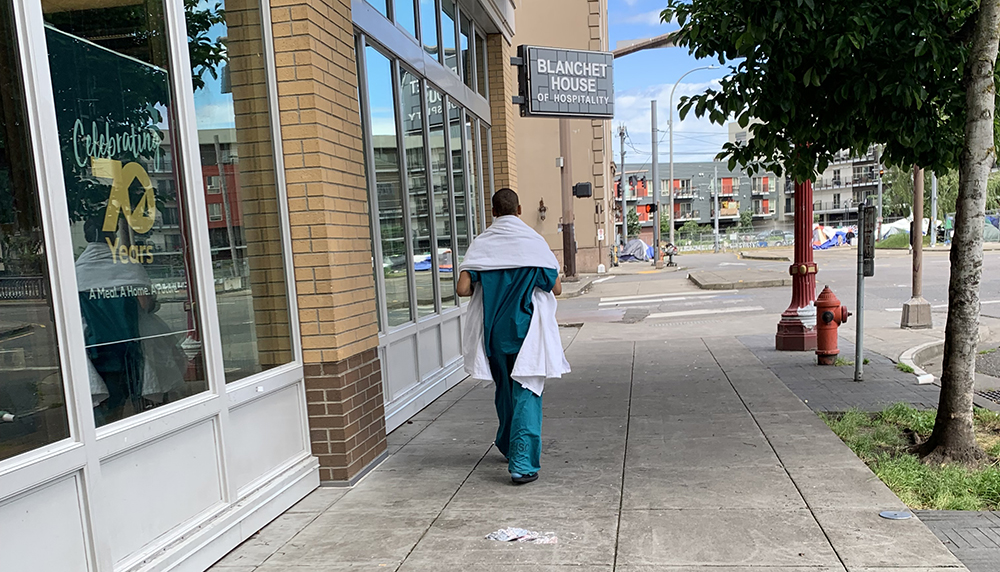
A person wearing hospital-issued clothing and carrying a blanket walks outside Blanchet House in 2021.
People With Untreated Mental Illness Are Being Released to the Street
After a short hold in the hospital, where she received medication and care, M was discharged back to the street. An additional 14-day hold was requested but denied. When asked by the hospital where she’d like to be discharged, M said Blanchet House, because presumably, that’s where she feels safe. We told the hospital that this meant discharging her to our sidewalk. We do not have the facilities or staff to care for people with acute mental illness. The hospital tried to take her somewhere else, but that didn’t work out. So, at 4 p.m. on a Friday, we found M on the ground behind a dumpster in our parking lot baking in the sun. She showed us an unopened bottle of prescription medication she was given for her schizophrenia, but let’s be real she’s in no position to follow directions on a pill bottle or keep track of it.
Jennifer Ransdell, who manages our meal services, brought M clean clothes, a rolling suitcase, and a sleeping bag. She helped M sort through a garbage bag of belongings including old food that was rotting. M showed Jennifer her discharge papers and prescription. She referred to herself in the third person saying the medicine was for someone else. The situation brought Jennifer to tears.
Persons with mental illness who are discharged from hospitals are often dropped off at Blanchet House, Rose Haven, or other nonprofit day centers because there’s nowhere else to take them. Together we make sure people like M have food, clothes, and water but we can’t provide a bed with long-term care. We are not equipped for that.
Sadly, M’s story is not unique. We’ve cropped M out of photos because we’re not looking to exploit or humiliate her, but we want the public to know how people are suffering. Throwing vulnerable people to the streets likely won’t stop until something fundamentally changes about how we care for people with mental illness in Oregon. Oregon is woefully behind when it comes to having sufficient facilities and staff to support our mental health crisis.
We also need to have a frank and difficult conversation about standards for holding people for critical treatment, what it really means to be “a danger to oneself,” and what trauma-informed, humane care looks like for people with severe mental illnesses.
Though money alone won’t fix this growing problem, it can help us bridge the gap until permanent solutions are in place. Like many charitable day service agencies, Blanchet House receives no funding from the county, city, Joint Office of Homelessness (JOHS), or the Metro bond. Yet, we are relied on to keep our community’s most mentally ill members fed, clothed, and alive. Or as one volunteer said to me, “Blanchet House has become the unofficial annex of the Oregon State Hospital cafeteria.”














